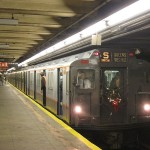Public transport options dismal for seniors, study shows
Public transport will not be a viable option for baby boomers in many U.S. cities when they enter retirement age according to the Transportation for America Report presented in Congress today.
The study reveals that 15.5 million retirees ages 65 to 79 will have poor or absent access to public transport four years from now. Many seniors live in America's suburbs which do not have adequate public transportation infrastructure, the report said.
With many seniors used to driving in their younger years, this could mean less socialization or even a matter of life and death.
"The baby boom generation grew up and reared their own children in communities that for the first time in human history, were built on the assumption that everyone would be able to drive," explained John Robert Smith, co-chairman of the Transportation for America trade group.
In Atlanta, some 90 percent of seniors are expected to live in communities with poor access to public transport. Riverside-San Bernardino, California, Detroit and Dallas also received poor ratings in the study.
In contrast, the New York metropolitan area is considered the best area with access to public transport for seniors, the study said.
Many Americans still drive well into retirement age. But the loss of income, cost of owning a vehicle and health problems can prevent them from driving. Those who are aged 65 years old and above are found to make 15 percent fewer visits to their physicians and up to 65 percent fewer visits to family and friends.
Lawmakers are studying a handful of legislative measures to enhance the access to public transport by seniors in the coming years.
